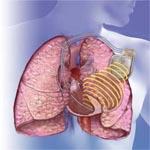
September 15, 2009 – Fluid monitoring with OptiVol Fluid Status Monitoring is a more accurate predictor of worsening heart failure compared to daily weight monitoring in heart failure patients with implantable devices, according to results released yesterday from the FAST (Fluid Accumulation Status Trial) clinical trial.
Results showed that Medtronic Inc. OptiVol Fluid Status Monitoring, which measures changes in fluid build up in the chest cavity, predicted 76 percent of future heart failure events as compared to only 23 percent detected by weight monitoring alone. Medtronic said the results showed OptiVol was three times more sensitive. FAST findings were presented as a late breaking clinical trial during the 13th Annual Scientific Meeting of the Heart Failure Society of America (HFSA) in Boston.
“This data shows that OptiVol Fluid Status Monitoring is a more accurate predictor of heart failure events than weight monitoring alone,” said William T. Abraham, M.D., professor of medicine and physiology, at Ohio State University and FAST principal investigator. “Instead of relying on patients with implantable heart devices to weigh themselves daily, the standard of care should include the use of implantable fluid status monitoring technology to identify worsening heart failure before symptoms worsen and lead to hospitalization.”
Key findings from FAST include:
• OptiVol accurately predicted 48 of 65 heart failure events in 31 patients, which corresponds to a per patient adjusted sensitivity (some patients had more than one heart failure event) of 76 percent, whereas weight monitoring detected 13 heart failure events for a per patient adjusted sensitivity of 23 percent.
• Forty heart failure events were predicted using OptiVol, but were not detected by weight monitoring. Conversely, weight monitoring identified only five events undetected by OptiVol. Eight events were detected by both fluid and weight monitoring.
• Fluid monitoring had an unexplained detection rate of 1.9 events per patient per year as compared with 4.3 events per patient per year with weight monitoring.
• OptiVol data was available for nearly every day of follow-up on all patients in the trial, whereas daily weight data was not provided by patients for 24 percent of the follow up period.
FAST is an international, prospective, double-blinded study involving 156 implantable cardioverter-defibrillator (ICD) or cardiac resynchronization therapy-defibrillator (CRT-D) patients followed for an average of 18 months at 18 centers in the United States, Canada and Hong Kong. Patients with an OptiVol fluid index crossing above 60 ohm days (units used to measure fluid index) were compared to acute weight increases of three pounds overnight or five pounds in three days. Heart failure events are defined as hospitalizations, emergency room visits, urgent care or unscheduled office visits. Heart failure events detected in this study were within 30 days of a fluid index threshold crossing or an acute weight gain. Unexplained detections were threshold crossings or acute weight gains not associated with a heart failure event.
The OptiVol Fluid Status Monitoring is available only on Medtronic CRT-Ds and ICDs, and has been available since FDA approval in 2004. It uses low-level electrical pulses that travel across the thoracic cavity (the chest area encompassing the lungs and heart) to measure the level of resistance, indicating fluid in the chest – a common sign of heart failure. Since normal fluid levels vary from patient to patient, and fluid accumulation can be either slow or rapid, OptiVol’s ability to measure fluid status trends over time can provide important insights that are used in conjunction with ongoing monitoring of other patient signs and symptoms. As of Jan. 1, 2009, the U.S. Centers for Medicare and Medicaid Services (CMS) began reimbursing physicians for their time spent monitoring heart failure patients using fluid trend data obtained from Medtronic implantable cardiac devices via a Medtronic CareLink Network remote transmission.
For more information: www.medtronic.com


 January 05, 2026
January 05, 2026 









